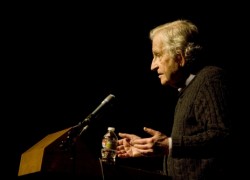
Noam Chomsky, a world-renowned intellectual who many consider to be the founder of modern linguistics, spoke at U. Arizona on Wednesday about his views on higher education.
Although this was Chomsky’s first visit to the UA, he has a long lasting connection to the university. The UA has an “unusually large number of people” who have either been a student or department fellow of Chomsky’s, said Thomas Bever, a regents’ professor of linguistics.
“Imagine that we had Einstein or Newton come and speak. In the world of linguistics and cognitive science, Chomsky is like Newton or Einstein for physics,” said Massimo Piattelli-Palmarini, a professor of linguistics who has collaborated with Chomsky for many years.
Thousands of people lined up to hear Chomsky speak. Those who were unable to get into Centennial Hall were taken to the Social Sciences building to see a recording of the event.
David Blechman, a political science senior, waited in line for more than four hours to hear Chomsky speak.
“This man is one of the premier intellects of our day,” he said. “It’s important to be on the forefront of intellectual thought, especially being in an academic environment like this.”
Chomsky was introduced as the most cited living author and third most cited individual in the world, behind Plato and Sigmund Freud.
At the start of the lecture, Chomsky addressed the question, “Who is education for?”
“For a long time there was a thought that education is just for the upper elite, they are the ones who should make decisions,” Chomsky said, adding that education should be accessible to everyone.
Chomsky also criticized instructional teaching, in which students simply memorize information.
“The early joy of discovery is ruined by memorizing the facts,” Chomsky said. “I remember when I was a 16-year-old freshman at the University of Pennsylvania, I had to take a general chemistry class that was exceptionally boring. So I never went to class, just memorized the book,” Chomsky said he received an A in the class.
Chomsky recalled a time when a professor who he had worked with at Massachusetts Institute of Technology was once asked by his students on the first day of class what material was going to be covered. The professor said, “It doesn’t matter what we cover, it matters what we discover. If you discover that everything that I’m teaching is wrong, that would be good.”
For the rest of the lecture, Chomsky focused on the relationship between people in power and the education system.
“The great charter that calls for preservation of the commons has been forgotten. Failure to attend to the commons is a serious problem,” Chomsky said. “Extraterrestrials watching must think that we’re all lunatics. Unless that is restored, we’re in trouble.”
A related problem, he said, is that fashionable consumptions are becoming more important than human values. People used to hold strikes for dignity, but this has been beaten back for generations.
“In fact, the Occupy movements that have be appearing all over have been reviving it (striking for dignity),” Chomsky said.
Chomsky talked about Tucson Unified School District’s decision to get rid of its Mexican-American studies program.
“It’s a particularly ugly part of the whole attack on the enlightenment ideal on higher education,” Chomsky said, adding it’s particularly dramatic that this happened in Tucson, a place that could be called “Occupy Mexico.”
Chomsky quoted Bertrand Russell, one of the founders of the modern university system, and said education is like a string in which the student progresses in his or her own way.
When Chomsky finished speaking, he spent some time answering questions from the audience.
Garrett Swenson and Kendra Hilty, retailing and consumer sciences seniors, said they had never heard Chomsky speak about education before.
“His insight to tuition increasing was great. We both think that everyone at the university should have attended and been able to hear what he had to say,” Hilty said. “Knowledge is power, and Noam Chomsky definitely understands that.”
